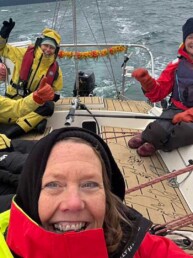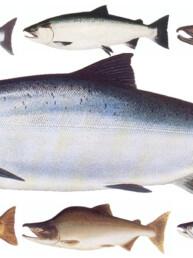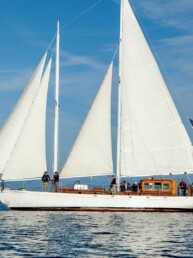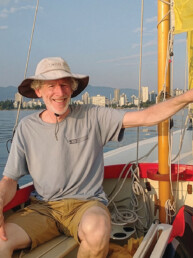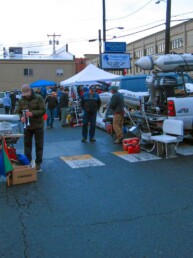Red Ruby is a Jeanneau Sun Fast 3300 co-owned by Pacific Northwest sailors, Jonathan McKee and Christina and Justin Wolfe. The boat is based in Europe and the group is running parallel shorthanded offshore campaigns on the shared platform. They will be checking in regularly with 48° North throughout 2023. The Wolfe team competed in the 2022 UK Doublehanded Offshore Series, and finished the series an incredible 2nd-place in a fleet of 35 boats. More recently, Jonathan and fellow Seattle sailor, co-skipper Alyosha Strum-Palerm, sailed the famed Rolex Middle Sea Race. Their story of that adventure is shared here.
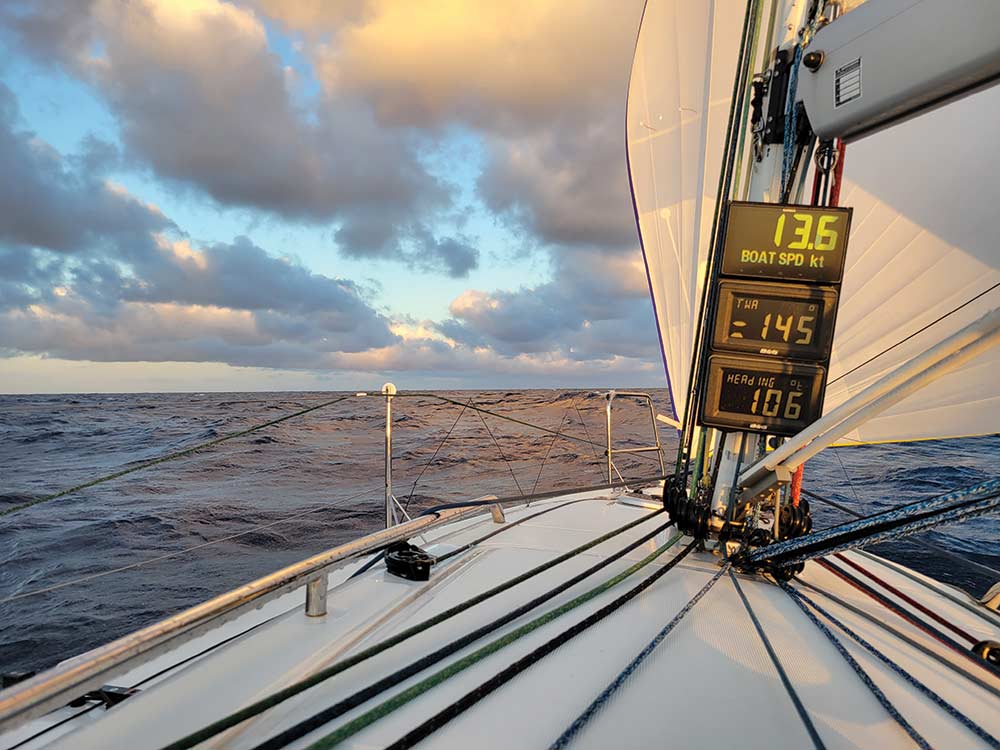
It has been a long, strange trip to far flung Malta, but we are finally on our way home to Seattle. Here is the tale of our last three weeks — two Seattle guys going sailing, trying to sail, preparing to sail, and thinking about sailing, with some sightseeing thrown in!
My co-skipper, Alyosha Strum-Palerm, and I started this adventure in Barcelona, where our 33-foot Red Ruby had been trucked from England. Our advance man, Erik Kristen, was already on the scene preparing to step the rig and launch the boat. We had a little extra work to do on the bottom and a few other small projects but, despite the jet lag, we got Red Ruby in the water on October 12, filled up our jerry jugs with diesel, did some food shopping, and headed south across the Mediterranean Sea as the sun was setting.
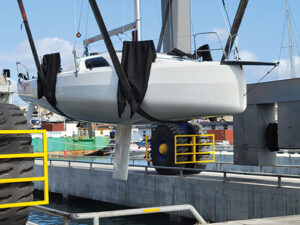
The Delivery
The delivery from Barcelona to Malta is 700 miles, but we had quite a favorable forecast so we hoped for a 4- or 5-day passage. The first night was jib reaching in 15-25 knots with some heavy showers. Not super comfortable, but we got down the track nicely. By morning, Menorca was visible to leeward and soon astern. The next land would be the south tip of Sardinia. The breeze slowly died and we motored for a few hours.
By the early evening, the breeze filled from the north and we set the A2 spinnaker. The wind angle was perfect and the breeze built through the night. By dawn, it was blowing 20 knots and Sardinia started to appear. As we got lifted, we jibed onto starboard for the first time — now heading south towards Africa. It was lovely sailing all day and, in the afternoon, the coast of Tunisia came into view.
We were ripping off the miles as we completed day two and, at sunset, we jibed again towards Malta. The wind then decreased and we spent the night dodging ships and keeping Red Ruby moving. In the morning, we had a nice chat with the Tunisian coastal authorities over VHF, assuring them of our peaceful intentions. We were 8 miles off the coast of Africa.
Day three was one of the coolest sailing days I have had for a long time. The wind built to 20-25 knots and our Sun Fast 3300 was performing beautifully in the building seas. We started to understand the brilliance of the unusual hull form. Alyosha and I took turns steering and resting below, and often used the autopilot as well. By noon, we were close to the volcanic island of Pantelleria, just 100 miles from our destination. Late that afternoon, we were seeing gusts near 30 knots and we decided the prudent call was to drop the kite. We sailed the last 30 miles with main only, arriving in Valletta Harbour at 2 a.m. Surprisingly, the Royal Malta Yacht Club dockmaster was waiting for us and escorted us to our slip. We folded the main and went to bed after quite a day of yachting.
The journey had taken us only 3 days and 7 hours — pretty quick for a 33-footer over 700 miles! We also got a good feel for life onboard, established our offshore routines, and gained a lot of confidence in our little vessel.
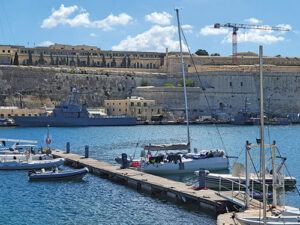
The Malta Experience
We had a wonderful time in Malta with our partners Libby Johnson McKee and AnaLucia Clarkson, and my brother in law David McGrady. We explored the island’s many interesting features and history, and we ate well. We also worked on preparing the boat for the race, including an additional haul out to fine tune the bottom finish. The club was very friendly and we felt welcome and happy to be there. As more racers arrived the vibe got a bit more intense, but we generally kept our heads down and focused on being ready for the start.
One of the nice features of the Rolex Middle Sea Race is a coastal race a few days before the main event. We sailed in the race and we were assisted by our support team Libby, AnaLucia, and David. It was a light air affair, starting in the smaller harbor and racing down the coast of Malta, around Comino Island and back. It turned out to be a preview of the Middle Sea Race itself, with very close racing between Red Ruby, the Maltese J/99 Calypso, and the JPK 1080 Solenn for Pure Ocean, both very well sailed. The course was shortened midway and we finished third. It was our first trophy (although our partners in Red Ruby, Chris and Justin Wolfe, had already won a slew of trophies in England)!
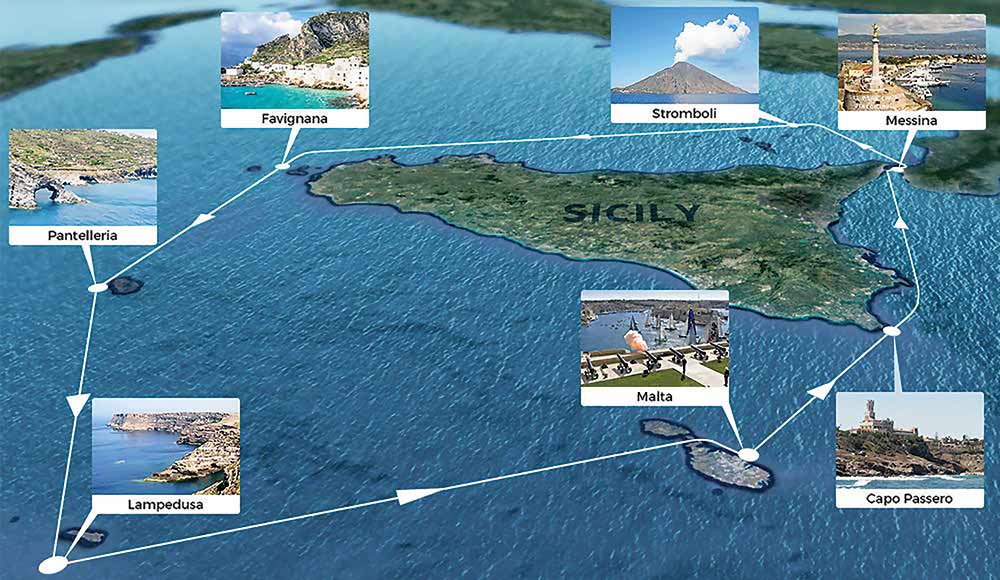
The Middle Sea Race
As we went through our daily weather briefings it was clear the race would have some light air, so we moded our boat appropriately and got more provisions. The start was quite exciting. A lot of boats on a starting line extending across the historic Valletta Harbour, and very little wind. We got out of the harbor cleanly but a little behind some of our rivals. Once in the open Mediterranean, we found some good downwind form in the 4-7 knot wind and started to work our way north towards Sicily. The race was on!
The first night was pivotal. As we got closer to the south tip of Sicily, the wind picked up from the southwest, but there is often a big lee if you get behind the higher land. Alyosha kept us well offshore and clear of what turned out to be a big parking lot for many boats. We kept moving and, by morning, we were into a moderate west wind, heading towards the fabled Straits of Messina. Only four of our class of 27 had gotten through the night in good shape, and we were one of them.
We had a great battle on day two with another doublehander, the French team Solenn, reaching and then upwind for the last 40 miles to the narrow passage between Sicily and Calabria — the Strait of Messina. The 12,000-foot volcanic peak of Mt. Etna was constantly in the background. The crew on Solenn were a little faster but we kept it close. The two leaders in Class 6 — Calypso and another Italian JPK 1080 Columbre — were about 6 miles ahead but, as the wind died after Messina, all four boats compressed to within 2 miles. It was all on. Except there was very little wind. And not a promising forecast.
That second night was one of the tough ones. The wind was sometimes 3-4 knots, other times zero. We made some good plays but also had some tough periods, and maybe it was not optimal conditions for our boat. As it turned out, we only traveled 35 miles in the next 24 hours. So that was a test of patience. Meanwhile, the two leaders had extended to a 6 mile lead, though we were still close behind our French friends on Solenn.
Day three was dominated by the giant conical presence of Stromboli, an actively venting and spewing volcano. It is a mark of the course, before the westward turn towards Palermo. Since there was so little wind, we got to see it for a long time! We finally got there at sunset, and a light southeast wind started to fill. The next 10 hours were great sailing — reaching then running in 9-12 knots straight down the course. We caught up to both Solenn and Calypso, which was gratifying. Then the wind died again off Palermo, 40 miles from the gate at Favignana Island. Then we had an incredible close encounter with a very large whale who was sleeping as we drifted by!
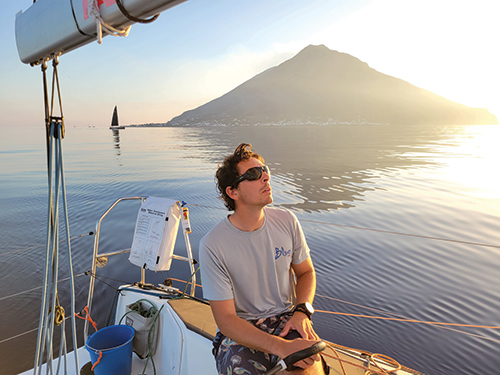
It was a slow afternoon and early evening but eventually a northwest breeze of 10 filled in for a couple of hours, allowing us to make headway to within 8 miles of Favignana before it died again. At this point, Columbre gave us all the slip to the west and secured the lead that would eventually give them the class win. As the morning dawned to a glassy sea, we were close behind the French and just ahead of the Maltese on Calypso.
We were able to download fresh weather forecasts as the race went on. Unfortunately, the news on that morning of day four was not good. Very little wind was forecast for the next 3 days. We made the decision to drop out of the race and return to Malta. This was a really hard call. It had been a huge task to get the boat from England to Malta and do all the thousands of things to get prepared for this race. We had worked really hard during the race. At the time we quit, we were probably winning the doublehanded division on corrected time and were likely third in our class overall. But we also had commitments at home that could not be ignored and, in the end, we felt we had achieved most of our goals for the trip.
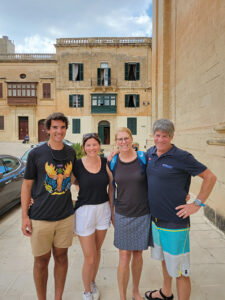
Hats off to the two boats that persevered in our class. After more than 7 days of racing, the Italian Columbre won easily, with the French duo on Solenn for Pure Ocean second. Calypso also eventually retired. We had great racing with all three boats, and we learned a lot trying to keep up with these top-level teams. We would like to have finished, but we are also proud of our effort and feel we can compete against top teams going forward in 2023. Thanks a lot to all who have supported our Middle Sea Race, especially our boat partners Christine and Justin Wolfe, our advance man Erik Kristen, and our support team in Malta, Libby, David, and AnaLucia.
Seattle’s Jonathan McKee is a world-renowned sailor. He was recently inducted into the National Sailing Hall of Fame.

